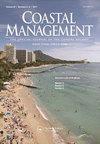The Environmental Compensation Fund: Bridging Liability Gaps in the Deep Seabed Mining Regime
IF 1.9
4区 环境科学与生态学
Q4 ENVIRONMENTAL SCIENCES
引用次数: 0
Abstract
Abstract The current transition period from exploration to exploitation in deep seabed mining (DSM) has witnessed efforts on the part of the international community to draft regulations for the exploitation of mineral resources in the Area. The production of the “Draft Exploitation Regulations” has been a priority theme in recent International Seabed Authority (ISA) sessions. Although discussion in reducing environmental impacts has been central to the progressive instrument, some liability gaps and approaches to close such gaps have not come up with desirable solutions. Against this background, the paper underscores the need for an Environmental Compensation Fund (the Fund) to bridge these gaps under the DSM regime. The paper argues that the three provisions about the Fund envisaged in the Draft Exploitation Regulations fall short of adequate deliberation and operational details. To bridge up the liability gaps, some critical issues in operating the Fund need to be carefully considered regarding the establishment, purpose, contributions, and claims for compensation. The paper suggests that the ISA may take the key elements of existing compensation funds, inter alia, the IOPC Funds to improve the operation and function of this Fund.环境赔偿基金:弥补深海采矿制度中的责任差距
摘要在当前深海海底采矿从勘探到开采的过渡时期,国际社会努力起草“区域”内矿产资源开采条例。编制“开采条例草案”一直是国际海底管理局最近几届会议的优先主题。尽管减少环境影响的讨论一直是渐进文书的核心,但一些责任差距和弥补这些差距的方法并没有找到理想的解决方案。在这种背景下,该文件强调了建立环境补偿基金的必要性,以弥补需求侧管理制度下的这些差距。该文件认为,《开采条例草案》中设想的关于该基金的三项规定缺乏充分的审议和操作细节。为了弥补负债缺口,需要仔细考虑基金运作中的一些关键问题,包括设立、目的、捐款和赔偿要求。该文件建议,ISA可以利用现有薪酬基金的关键要素,特别是IOPC基金,来改善该基金的运作和功能。
本文章由计算机程序翻译,如有差异,请以英文原文为准。
求助全文
约1分钟内获得全文
求助全文
来源期刊

Coastal Management
环境科学-环境科学
CiteScore
6.00
自引率
0.00%
发文量
24
审稿时长
>36 weeks
期刊介绍:
Coastal Management is an international peer-reviewed, applied research journal dedicated to exploring the technical, applied ecological, legal, political, social, and policy issues relating to the use of coastal and ocean resources and environments on a global scale. The journal presents timely information on management tools and techniques as well as recent findings from research and analysis that bear directly on management and policy. Findings must be grounded in the current peer reviewed literature and relevant studies. Articles must contain a clear and relevant management component. Preference is given to studies of interest to an international readership, but case studies are accepted if conclusions are derived from acceptable evaluative methods, reference to comparable cases, and related to peer reviewed studies.
 求助内容:
求助内容: 应助结果提醒方式:
应助结果提醒方式:


